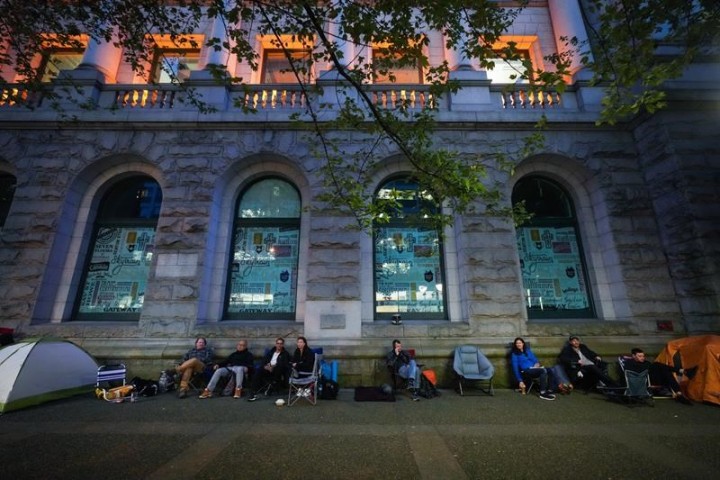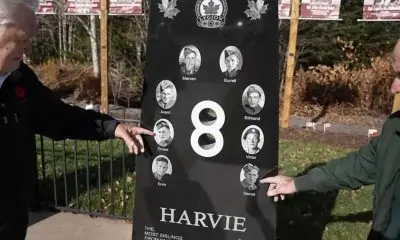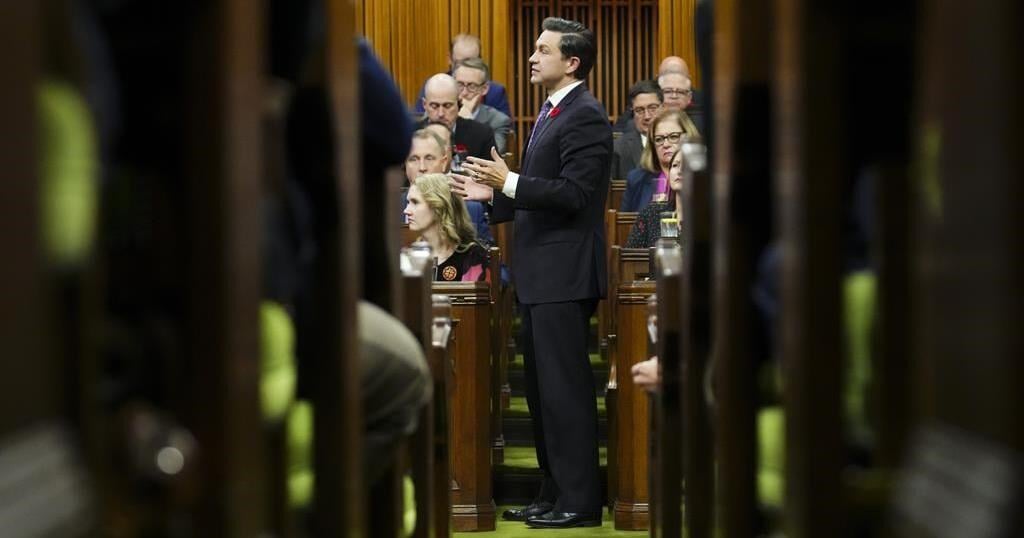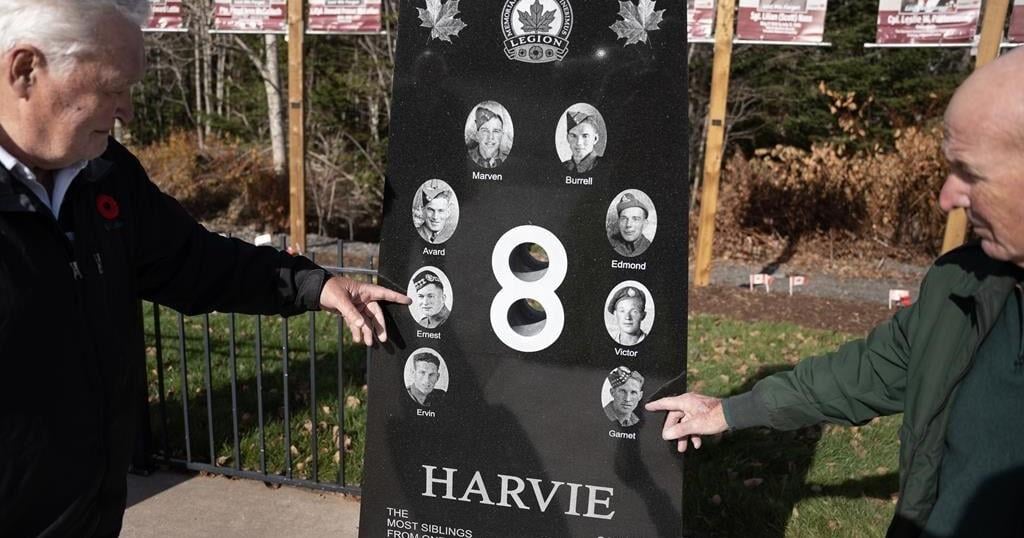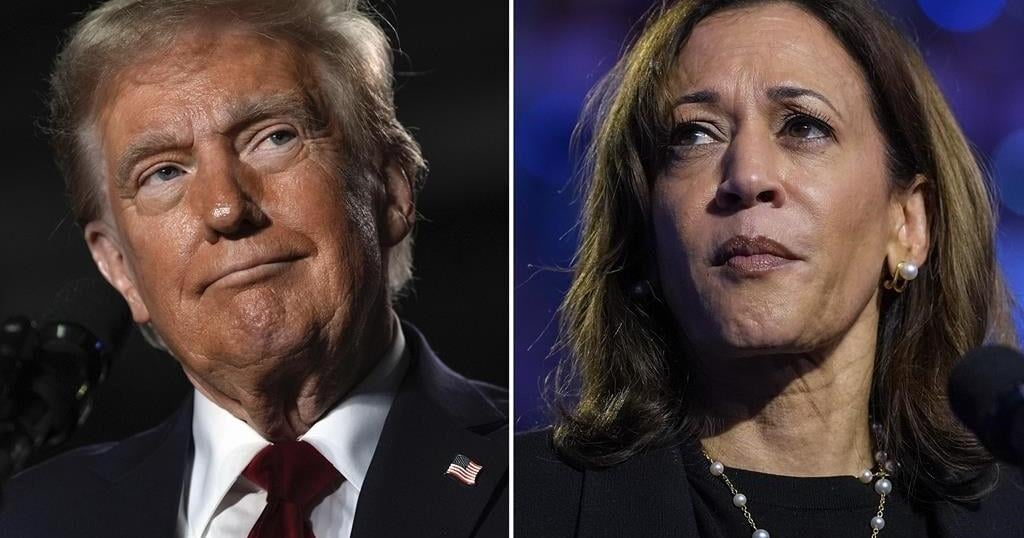HALIFAX – Federal Conservative Leader Pierre Poilievre is riding a wave of popularity in most parts of Canada these days, but you wouldn’t know it if you asked the leader of Nova Scotia’s incumbent Progressive Conservatives.
Tim Houston, who is seeking a second term in the premier’s office, said Monday he had no plans to invite Poilievre to join him on the campaign ahead of the Nov. 26 provincial election.
“No, because … I’m not a member of any federal party,” Houston told reporters during a campaign event in Halifax.
“There is no federal equivalent to the Nova Scotia PC party … there is a Conservative Party of Canada. That’s a completely different party with a different leader. I am not a member of that party. I have no intention of inviting the leader of the Conservative Party of Canada to campaign with me.”
He did not mention Poilievre by name.
Houston went on to explain that no real division exists between the federal and provincial wings of the New Democratic Party and the Liberal party.
“I am not beholden to any federal leader like my counterparts in this election are,” the 54-year-old accountant said, referring to provincial NDP Leader Claudia Chender and Liberal Leader Zach Churchill, both of whom are contesting their first election as party leaders.
“It would be a welcome sight if either Mr. Churchill or Ms. Chender would put Nova Scotians before their party politics.”
For the past week, however, Houston has frequently taken partisan shots at Churchill, trying to link him with the flagging popularity of Liberal Prime Minister Justin Trudeau.
But that strategy — a favourite among conservative premiers — can be risky, said Erin Crandall, a politics professor at Acadia University in Wolfville, N.S.
“If you’re framing the attachment between a federal and provincial party as a detriment … it would be contradictory to go ahead and campaign with what would be the equivalent party leader at the federal level,” Crandall said.
More importantly, Crandall said the latest polls suggest Atlantic Canadians are not that impressed with Poilievre.
Last month, Abacus Data released the results of a national survey of 1,900 people, showing that 40 per cent of committed voters surveyed in Atlantic Canada would support Poilievre, but that figure was the second lowest in the country, with Quebec voters showing the least interest in the Tory leader at 24 per cent.
On Saturday, Abacus CEO David Colletto released a Nova Scotia poll showing Houston’s party was well ahead in voter support, but it was clear that finding had little if nothing to do with Poilievre.
“One of the important findings from our … survey is the relative unpopularity of both Justin Trudeau and Pierre Poilievre in Nova Scotia,” Colletto said Sunday in a social media post. “As in other provincial elections, Trudeau will be a factor, but in (Nova Scotia), so too could Poilievre.”
While 56 per cent of those surveyed in Nova Scotia held a negative view of Trudeau, Poilievre wasn’t far behind at 45 per cent, the provincial poll indicated.
Crandall suggested Poilievre, well known for his combative, hardline approach to politics, is probably facing the same kind of pushback that led to the defeat last month of New Brunswick’s Progressive Conservative government led by Blaine Higgs.
Under Higgs, the Progressive Conservatives adopted a socially conservative approach that included championing, among other things, a decision to order teachers to seek parental consent before using the preferred pronouns of transgender students under 16 years of age.
“What we found in New Brunswick was that ended up alienating some traditionally conservative voters, those who view themselves as fiscally conservative but not socially conservative,” Crandall said. “There does seem to be less tolerance for that type of approach to politics.”
Poilievre did not take part in the New Brunswick election campaign.
And it’s almost certain Trudeau will not campaign in Nova Scotia.
Churchill, a 40-year-old former policy analyst and student organizer, said as much on Monday during a campaign event at the provincial Liberals’ campaign headquarters in Halifax.
“We’re running our own campaign,” said Churchill, who was first elected to the legislature when he was 26. “Tim Houston is trying to trick and fool people that this provincial election has something to do with whose governing the country. It doesn’t. So, no, we don’t plan (on inviting Trudeau).”
As for Nova Scotia’s NDP, which the Abacus provincial poll said was in a tight race with the Liberals for second place, Chender was joined on the campaign trail by federal NDP Leader Jagmeet Singh on Friday and Saturday, marking the end of the first week of the campaign.
“Jagmeet is our federal leader and a friend,” Chender, a 48-year-old lawyer and former consultant, said Monday during a campaign event in Halifax.
“We heard on the doorsteps how happy people are about things like the (federal NDP’s) dental care program … people are so excited to finally get dental care when they couldn’t afford to before.”
Crandall said the federal NDP’s decision to support Trudeau’s minority government for about three years through a now-defunct confidence and supply agreement probably won’t have much of an impact on the outcome of the Nova Scotia election.
“In comparison to the Liberals right now, the NDP federal leader is relatively popular,” Crandall said. “I don’t think (the federal NDP/Liberal alliance) is going to have much of an impact in the eyes of (Nova Scotia) voters.”
This report by The Canadian Press was first published Nov. 5, 2024.
Note to readers: This is a corrected story. A previous version said Premier Tim Houston is a former accountant. In fact, he still has his accounting certification.

